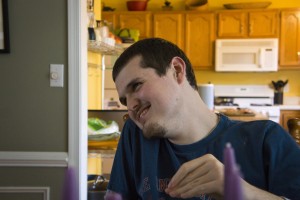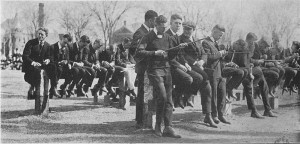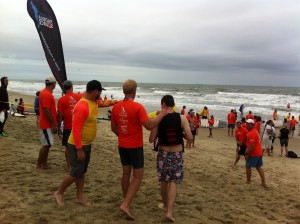People in my profession get asked to pray a lot. Many times, there isn’t even any asking going on – it’s simply assumed the pastor is the one who prays. When one of us pastor types goes off script and cheerfully offers for one of the other Christians in the group to have the honor, uncomfortable silence ensues. “Who feels called to offer a blessing for this meal?” Crickets.

I can’t blame the non-pastor types. It can be intimidating to be The One who announces through prayer – through what gets prayed for and what does not – where our collective focus lies and where we especially hope for the signs and wonders of God’s presence. Since, in many faith communities, pastors are the only ones who ever have the opportunity to pray, it can send the message that you need special training or voice intonation or secret knowledge about the “right” things to say.
A couple of weekends ago I got to be one of the listeners as a group prayed together. We took my stepson to a wonderful surf camp offered by Surfer’s Healing. I’ve written about them before and the overwhelming nature of standing on a beach together watching our children go out to sea without us. This year I was teary and moved again. I found myself standing at the shoreline with gripped hands at my chest – almost in a prayer position – holding my breath, watching him work on trusting the surfers enough to go where they led.
It was breathtaking and comforting again to move through this “one perfect day” together, rehearsing the hard letting go of parents. But what struck me this time was the ritual of beginning the day.
Once the surfboards are unpacked and lined up at the shore, the beach area roped off, and the registration tables up and running, the event organizers gather everyone. Logistical announcements and thank you’s are issued and then Izzy Paskowitz, the founder of Surfer’s Healing (along with his wife, Danielle), says a few words.
He and the other surfers all wear wetsuits and stand together in a line at the front of the gathering. Izzy talks about the “club none of us wanted to be in” as parents of autistic children and he talks about the generosity of sponsors and volunteers. Then he calls on one of the other surfers to come offer the first of several prayers before embarking on the day. We hear a prayer in English then a second surfer takes the mic and offers one in Spanish. Then a third surfer comes forward and sings a traditional Hawaiian prayer to the tune of the doxology.
When we first got to the beach I saw the surfers in wetsuits and felt some competing combination of being a geeky teenager around the cool kids and being an old mom. Each of them is young, many are tattooed, and they look sleek and muscular in their second skins. If I let my own high school experiences or movies clichés take over my thinking, they appear to me as a group of untouchably cool dudes.
But I look at them as we are praying. Every last one of them is holding hands with the surfers next to him, heads bowed. No one looks impatient, bored, or uncomfortable. I don’t get the feeling from any of them or from the crowd at large that this part of the day is imposed or strange or old-fashioned or constricting.
They do this every day of camp all season long. Before heading into rough waters with autistic children they’ve never seen before this moment, they pause and pray. As they gather their strength, stamina, patience, and hopes for a rough and rewarding day, they recognize their intentions and ask for God’s blessings on the camp. There was nothing showy about any of the prayers or the fact of praying together before beginning. I only consciously understood the words of the English prayer but I’ll go out on a limb and say none of the prayers were self-conscious or full of buzzwords. They were simple, short, in and of the moment, heartfelt.
I was completely taken aback and had to wipe tears from my eyes during the prayers. The sight of the cool dudes, long hair flying in the wind, holding hands and praying on the beach got me choked up. It was the opposite of what many of us experience in church – or what we are afraid will happen when we pray together in church, especially if one of the “non-professionals” offers the prayer.
That day on the beach, I began wondering about how we are teaching people to pray in context. For those of us who are asked/assumed to pray, how can we model praying so it’s an invitation to others to do the same? It seems to me that many times in the church we gather to offer prayers and ask God’s blessings on a meal or a service trip but our humility is hidden under slick phrasing or a tone-of-voice assumption that the prayer is a “lock on it” rather than the start of it.
What I experienced on the beach was a group of consummate professionals vulnerable enough to hold hands and remember the One who makes all days gifts. How can we professional pray-ers model this spirit and invite the non-professionals to the mic? What would this look like at tax time in an accountant’s office? In a writer’s room? Before surgery in an operating room?
I need to hear more prayers from the trenches, raised up from wherever by whomever, stating the simple but obvious truth and need of our lives. This matters and we give it to you – the success and the difficulty of it – and ask your blessing. We know you’re here. Thank God.









